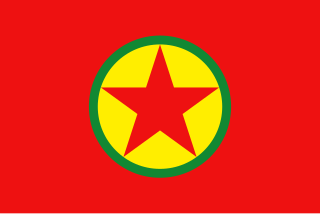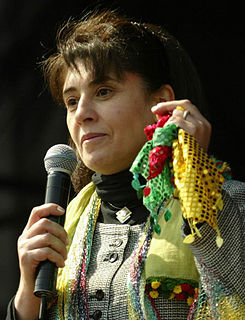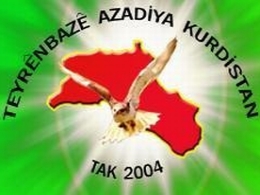
The Kurdistan Workers' Party or PKK is a Kurdish far-left militant and political organization based in Turkey and Iraq. Since 1984 the PKK has been involved in an armed conflict with the Turkish state, with the initial aim of achieving an independent Kurdish state, later changing it to a demand for equal rights and Kurdish autonomy in Turkey.

Abdullah Öcalan, also known as Apo, is a Kurdish leader and one of the founding members of the militant Kurdistan Workers' Party (PKK).
Jandarma İstihbarat ve Terörle Mücadele or Jandarma İstihbarat Teşkilatı is the controversial wing and intelligence agency of the Turkish Gendarmerie. JİTEM was active in the Kurdish–Turkish conflict. After the Susurluk scandal, former prime ministers Bülent Ecevit and Mesut Yılmaz have confirmed the existence of JİTEM.

Human rights in Turkey are protected by a variety of international law treaties, which take precedence over domestic legislation, according to Article 90 of the 1982 Constitution. The International Covenant on Civil and Political Rights (ICCPR) was not signed by Turkey until 2000. The issue of human rights is of high importance for the negotiations with the European Union (EU). Acute human rights issues include in particular the status of Kurds in Turkey. The Kurdish–Turkish conflict has caused numerous human rights violations over the years. There is an ongoing debate in the country on the right to life, torture, freedom of expression as well as freedoms of religion, assembly and association.

Leyla Zana, is a Kurdish politician, who was imprisoned for 10 years for her political activism, which was deemed by the Turkish courts to be against the unity of the country. When she was a member of pro-Kurdish Democratic Society Party, she was banned from joining any political party for five years with the Constitutional Court's decision to ban this party. She has been elected as an independent member of parliament for Diyarbakır by the support of Peace and Democracy Party.

Newroz or Nawroz refers to the celebration of the traditional Iranian peoples' New Year holiday of Nowruz in Kurdish culture. Before the Islamization of the Iranic peoples in Asia, the ancestors of the modern Kurds followed Zoroastrianism. In Zoroastrian doctrine, fire is a symbol of sight, goodness and purification. Angra Mainyu, the demonic anti-thesis of Zoroastrianism, was defied by Zoroastrians with a big fire every year, which symbolized their defiance of and hatred for evil and the arch-demon. In Kurdish legend, the holiday celebrates the deliverance of the Kurds from a tyrant, and it is seen as another way of demonstrating support for the Kurdish cause. The celebration coincides with the March equinox which usually falls on 21 March and is usually held between 18 and 24 March. The festival has an important place in terms of Kurdish identity for the majority of Kurds, mostly in Iraq, Turkey and Syria. Though celebrations vary, people generally gather together to welcome the coming of spring; they wear coloured clothes and dance together.
Kurdish women have traditionally played important roles in Kurdish society and politics. In general Kurdish women's rights and equality have improved dramatically in the 21st century due to progressive movements within Kurdish society. However, despite the progress, Kurdish and international women's rights organizations still report problems related to gender equality, forced marriages, honor killings and in Iraqi Kurdistan also female genital mutilation (FGM).
Kurds in Turkey refers to people born in or residing in Turkey who are of Kurdish origin. The Kurds are the largest ethnic minority in Turkey. According to various estimates, they compose between 15% and 20% of the population of Turkey. There are Kurds living in various provinces of Turkey, but they are primarily concentrated in the east and southeast of the country, within the region viewed by Kurds as Northern Kurdistan.

The Democratic Society Party was a Kurdish nationalist political party in Turkey. The party considered itself social democratic, and had observer status in the Socialist International. It was considered to be the successor of the Democratic People's Party (DEHAP). On 11 December 2009, the Constitutional Court of Turkey banned the DTP, ruling that the party has become "focal point of activities against the indivisible unity of the state, the country and the nation". The ban has been widely criticized both by groups within Turkey and by several international organizations. The party was succeeded by the Peace and Democracy Party.

The Kurdistan Freedom Hawks or TAK, is a Kurdish nationalist militant group in Turkey seeking an independent Kurdish state in eastern and southeastern Turkey. The group also opposes the Turkish government’s policies towards its ethnic Kurdish citizens.

Osman Baydemir is a Kurdish politician, lawyer and human rights activist in Turkey. He was the mayor of his home town of Diyarbakır from 2004 to 2014. He was a member of the Peace and Democracy Party (BDP) until 2014 and HDP since 2014.
This article discusses the human rights situation of Kurds in Turkey. Kurds have had a long history of discrimination and massacres perpetrated against them by the Turkish government. Massacres have periodically occurred against the Kurds since the establishment of the Republic of Turkey in 1923. Among the most significant is the Dersim rebellion where 13,160 civilians were killed by the Turkish Army and 11,818 people were taken into exile. According to McDowall, 40,000 people were killed. The Zilan massacre of 1930 was a massacre of the Kurdish residents of Turkey during the Ararat rebellion, in which 5,000 to 47,000 were killed.

The Kurdish–Turkish conflict is an armed conflict between the Republic of Turkey and various Kurdish insurgent groups, which have demanded separation from Turkey to create an independent Kurdistan, or to have autonomy and greater political and cultural rights for Kurds inside the Republic of Turkey. The main rebel group is the Kurdistan Workers' Party or PKK. Although insurgents have carried out attacks in many regions of Turkey, the insurgency is mainly in southeastern Turkey. The PKK's presence in Iraq's Kurdistan Region, from which it has also launched attacks, has resulted in the Turkish military carrying out frequent ground incursions and air and artillery strikes in the region. The conflict has cost the economy of Turkey an estimated US$300 to 450 billion, mostly military costs. It has also affected tourism in Turkey.
Crime in Turkey is combated by the Turkish police and other agencies. Since the 1990s, overall crime in Turkey has been rising. As of 2014, Turkey has seen a 400% rise in drug-related crimes, theft and homicide. In 1994, the number of arrested prisoners was recorded as 38,931; 20 years later, as of the beginning of October 2014, the number of prisoners has reached 152,335. According to the data provided by the Ministry of Justice, the crime rate is growing with each passing day.

The Iran–PJAK conflict, or Iran–Kurdistan Free Life Party conflict is an armed conflict between the Islamic Republic of Iran and the Kurdish guerrilla group Kurdistan Free Life Party (PJAK), which began in 2004 and largely ended in 2011. The group was carrying out attacks in the Kurdistan Province of Iran and other Kurdish-inhabited areas. PJAK is suspected to be closely affiliated with the Kurdistan Workers' Party operating against Turkey.
Ayşe Nur Zarakolu was a Turkish author, publisher and human rights advocate. She was co-founder, with her husband Ragıp Zarakolu, of notable Turkish publishing house Belge and, in the 1980s, became the director of book-distribution company Cemmay, the first woman in the nation to hold such a position. Zarakolu's publications brought her into frequent conflict with Turkish press laws; in 1997, The New York Times identified Zarakolu as "one of the most relentless challengers to Turkey's press laws". Issues Zarakolu helped publicize in Turkey include the Armenian Genocide and human rights of Kurdish people in Turkey. Imprisoned multiple times for her publications, she was designated a prisoner of conscience by Amnesty International and her legacy continued to face legal challenge in Turkey after her death. She has received multiple awards and honors for her work and the Human Rights Association of Turkey bestows the Ayşe Zarakolu Freedom of Thought prize in her honor.

Ahmet Türk is a Kurdish nationalist politician in Turkey and was born into a family of Kurdish landlords and tribal chiefs in southeastern Turkey.
Aysel Tuğluk is a pro-Kurdish Zaza politician and founding member of the Democratic Society Party (DTP) in Turkey. She graduated in law from Istanbul University and then worked as a lawyer. She was previously a member of the Social Law Researches Foundation Board Council.
The December 2009 Kurdish protests in Turkey were five days of protests in Turkey that ensued after a December 11, 2009 ruling by the Constitutional Court of Turkey that banned pro-Kurdish Democratic Society Party (DTP), after finding them guilty of having links to the outlawed Kurdistan Workers' Party (PKK) and spreading "terrorist propaganda."
The Lice massacre took place from 20 to 23 October 1993 in the town of Lice in southeast Turkey's Diyarbakır Province.













